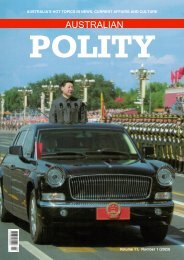Australian Polity, Volume 9 Number 3 - Digital Version
Australia's hot topics in news, current affairs and culture
Australia's hot topics in news, current affairs and culture
You also want an ePaper? Increase the reach of your titles
YUMPU automatically turns print PDFs into web optimized ePapers that Google loves.
Contrast this to the present day. The IMF estimates that
China’s share of global GDP will increase to 18.8 per
cent in 2021, up from just 7.7 per cent in 2001. China
became the world’s largest exporter of goods in 2009.
And by 2019, it accounted for over 13 per cent of global
exports. In 2001, the year that China joined the World
Trade Organisation, more than 80 per cent of countries
had a larger volume of trade with the US than with China.
By 2018, this figure was down to only 30 per cent. Almost
130 countries now have China as their largest trading
partner.
This combination of economic weight, global integration
and assertiveness poses new and significant challenges
for many countries around the world, and Australia is no
exception. Indeed, Australia is facing this pressure more
sharply than most other countries.
Australia is on the frontline of strategic
competition
China is our largest two-way trading partner, accounting
for over 30 per cent of our trade and the scope of our
trading relationship has broadened over time, evolving
from mining, to agriculture, to services such as tourism
and education.
Despite the COVID 19 disruption, China remained our
largest education export market in 2020, at $7.6 billion. In
many ways our economies are complementary, ensuring
the economic relationship is mutually beneficial. However,
it is no secret that China has recently sought to target
Australia’s economy, citing fourteen so called ‘grievances’,
covering everything from our foreign investment laws
to our willingness to call out cyber attacks. They have
targeted our agricultural and resources sector, with
measures affecting a range of products, including wine,
seafood, barley and coal.
We have remained steadfast in defending our sovereignty
and our core values. And we always will. As Foreign
Minister Marise Payne has said “that does not mean
we are anti China or anti any other country. It means we
want all countries to operate by the rules that protect
our shared interests”. But in the face of this new reality,
our economy has also proven to be remarkably resilient.
Despite China’s wide ranging actions, our economy has
continued to perform very strongly. At the headline level,
this is best reflected in our unemployment rate, which
has fallen to 4.6 per cent. The lowest level in around
thirteen years. Our headline trade performance has
also been strong, boosted by record commodity prices.
Indeed, our trade surplus hit a record high in the June
quarter of $28.9 billion.
I am not downplaying the impact of China’s actions. They
have hurt specific industries and regions, significantly
in some cases. Nevertheless, the overall impact on our
economy has, to date, been relatively modest. This is
perhaps surprising to many. But it is worth noting that
our exports to China of targeted goods accounted for
just 5.9 per cent of our total exports in 2019 and 1.2 per
cent of nominal GDP. And while China is easily our largest
trading partner, we also have deep trading relationships
with many other countries. Our two-way trade with the
US was worth around $73 billion in 2020; our trade with
Japan was worth around $66 billion; and our trade with
South Korea was worth around $35 billion - to name
just a few.
Our largest contributor to foreign direct investment is
the United States. China is only our sixth largest source
of foreign direct investment. This investment has fallen
by around 5 per cent since 2019, in line with a broader
decline in overseas investment from China overall.
We are also continuing to pursue new free trade
agreements to deepen our existing relationships and
open up new and growing markets. We have agreed on
the broad outlines of an Australia UK FTA. This will see
99 per cent of Australian goods, including wine, enter
the UK duty free.
Our Comprehensive Economic Partnership with Indonesia
entered into force in July last year, creating new export
opportunities in a large and fast-growing market. The
Comprehensive and Progressive Trans Pacific Partnership
(CPTPP) includes specific measures to help make it easier
for small businesses to establish new export markets.
This includes common and transparent trade rules to
cut administration costs.
34 Australian Polity





